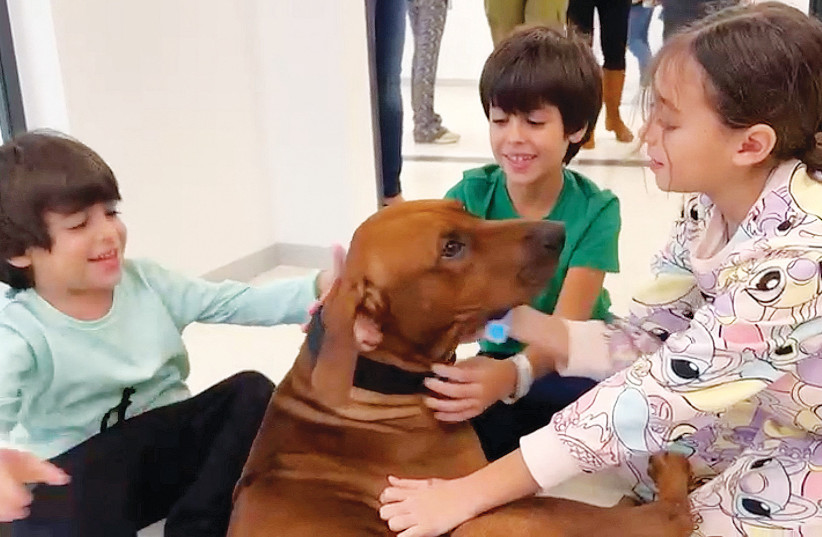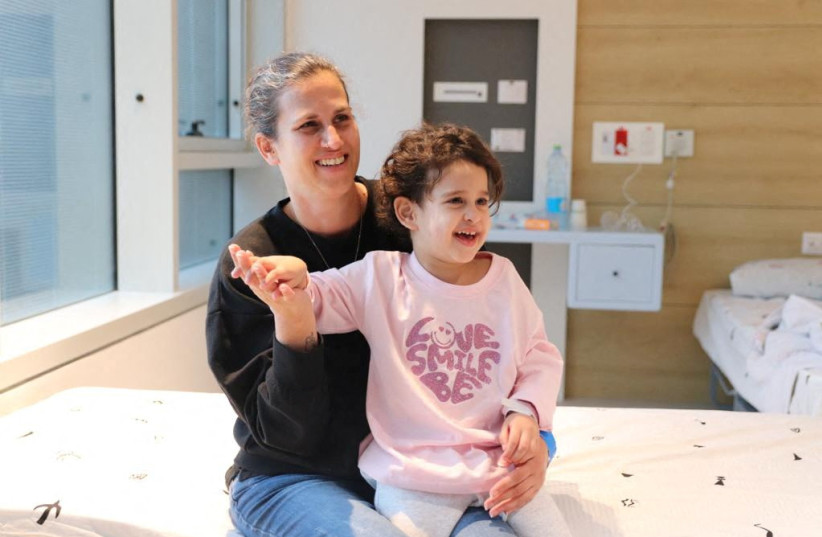Former hostage Hagar Brodutch and her three children were transported to a new prison in Gaza wrapped in white sheets via ambulance, Brodutch said in an exclusive interview with the Daily Mail’s Sabrina Miller published on Friday.
Recounting her experience, Brodutch said that she had awoken on October 7 in her home, located in Kibbutz Kfar Azza, to find her three-year-old neighbor Abigail Idan knocking at her door while drenched in the blood of her parents.
“It wasn't her blood, it was her parents' blood,” Hagar explained to the Mail. ‘She saw how terrorists, dressed in military uniforms, killed her mother.
“Her father picked her up and tried to run away with her brothers. But they killed him, too. She was in his arms when they killed him, and he fell on top of her. They let her go, and she ran to our house.”
Avigail Idan was placed in a safe room alongside Brodutch’s three children while her husband, Avichai, attempted to protect the kibbutz in his capacity as the community’s security guard.

Left alone with Idan, her ten-year-old, nine-year-old, and 4-year-old, Brodutch spent four hours hiding in the family’s safe room before 14 armed Hamas terrorists broke into her house and kidnapped all five of them.
“It's only kids! It's only kids! Please don't do anything!” Brodutch begged her abductors in Arabic.

Describing being driven away from the kibbutz, Brodutch said, ‘As we left Kfar Aza, I saw lots of houses burning. Dead bodies were piled in the fields and scattered on the ground.
“One of the terrorists told me: 'This is not Kfar Aza anymore. It is Kfar Moot' - which translates as 'the village of death.' And seeing this destruction, I believed him.”
Time as a hostage in Gaza
Brodutch described the thousands of Gazans celebrating in the street as the terrorists announced they had kidnapped an Israeli girl.
“The terrorists opened the car doors and pulled my hair [to show me off] to the thousands of people in the streets. Then they grabbed my daughter by her shirt and showed her off to the crowd. They were boasting that they had stolen a little Israeli girl. All the people were cheering,” she recounted.
The family and three-year-old Idan were held captive in the home of a Palestinian family. Product said she was locked in a dark 12 square meter room with another Israeli hostage, where they were barely fed and forced to sleep on dirty mattresses lining the floors.
“There was no running water, no electricity. They gave us two notebooks and a few pencils, but we weren't allowed a sharpener,” she said.
I” thought that nobody cared about me. And that Avichai – my husband – was dead,' she explained. “I thought that Israel had forgotten about us.
“We were in Gaza for 51 days. A woman and four kids. On the first day, I believed that Israel would do whatever it took to come and rescue us straightaway. I never thought they would bomb Gaza with the hostages still inside.
“We weren't allowed to cry or scream or make any noise. We had to whisper all the time. It was a nightmare trying to keep them quiet.”
Brodutch said that the sound of airstrikes hitting new buildings filled her with fear, and she was concerned that she would be injured and unable to protect her children.
After only 12 days in captivity, the house that Brodutch and her children were imprisoned in was hit during an airstrike. The family all survived but were quickly transported to new holdings.
Brodutch told the Mail, and they were forced into white sheets so they would not be recognized and transported to a new prison via ambulance.
She said the new prison had once been a room for a young girl. It had a child's bed, a cupboard full of small clothes, and some toys and games. Despite this, she said the conditions were significantly worse in her new prison compared to the previous one.
“Every day, we got less and less food. We were starving. The kids were starving. They were fighting with each other for crumbs and scraps on the floor. I would give them most of my food and eat a little bit just to survive,” she recounted. “Even though there was a little girl's bed in the room, no one wanted to sleep on it. The kids wanted to sleep in a huddle next to me on the floor all the time. They were terrified.”
Brodutch said that she tried to avoid speaking with the few captors who spoke English, afraid that she would say something that would cost them their lives.
Leading up to their release, they were again moved after 51 days in captivity. The new prison housed another hostage, but the family was forbidden from speaking.
“Me and the other hostage. We tried to whisper to understand what was going on, but every time they caught us, they were very angry, and they would scream at us,” she said.
On the day they were finally released, Brodutch was forced into a hijab and driven to a rendezvous point where they met with other hostages to be released.
“As we were arriving at a drop-off spot, my neighbor [from Kfar Aza] saw me from a few meters [away], and she just started screaming, she said. “We weren't allowed to scream anytime, but she saw me and screamed: 'Hagar, Avichai is waiting for you. I heard him on the radio.’
“I never cried in Gaza. I couldn't feel anything. I was empty the entire time. But when I saw my friend and neighbor, and I heard Avichai was alive, I erupted into tears.”
Being driven to the Red Cross, Brodutch described thousands of Gazans lining the streets to intimidate the family.
“You think 50 meters is a short distance? It isn't,” she explained. “It is a really long distance when you have to walk 50 meters past a screaming, cheering crowd jumping at you and trying to grab you. It was completely terrifying.
“And the entire time we were driving through the streets of Gaza, people in the streets were shouting at us and jumping on the car.”
The impact of being held hostage
Brodutch said her children have not recovered from the trauma. “The children look the same, but they are not the same,” she described. “Our four-year-old Oriya just can't be separated from me. He is with me all the time. Yuval, who is eight, has just started back at school for a few hours daily. Ofri – the big one – has nightmares. She is afraid of terrorists all the time. She is petrified by every little sound.
“It's not just that we were kidnapped and all the hell we've been through there. Also, our community was destroyed, and lots of my friends are dead.”
Finishing the interview, Brodutch insisted that the release of hostages must be the government’s number 1 priority.
“All the remaining hostages should come back home right now,' she said. “No matter what. They're in hell.
“The hostages are ordinary people taken from their beds. They should be back home right now. There are still two babies in Gaza – Kfir and Ariel Bibas – they should be home now.”
